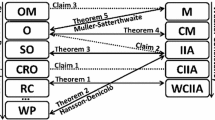Abstract.
Self-selectivity is a new kind of consistency pertaining to social choice rules. It deals with the problem of whether a social choice rule selects itself from among other rival such rules when a society is also to choose the choice rule that it will employ in making its choice from a given set of alternatives. Koray [3] shows that a neutral and unanimous social choice function is universally self-selective if and only if it is dictatorial. In this paper, we confine the available social choice functions to the tops-only domain and examine whether such restriction allow us to escape the dictatoriality result. A neutral, unanimous, and tops-only social choice function, however, turns out to be self-selective relative to the tops-only domain if and only if it is top-monotonic, and thus again dictatorial.
Similar content being viewed by others
Author information
Authors and Affiliations
Additional information
Received: 8 October 2001/Accepted: 4 June 2002
Rights and permissions
About this article
Cite this article
Koray, S., Unel, B. Characterization of self-selective social choice functions on the tops-only domain. Soc Choice Welfare 20, 495–507 (2003). https://doi.org/10.1007/s003550200195
Issue Date:
DOI: https://doi.org/10.1007/s003550200195




